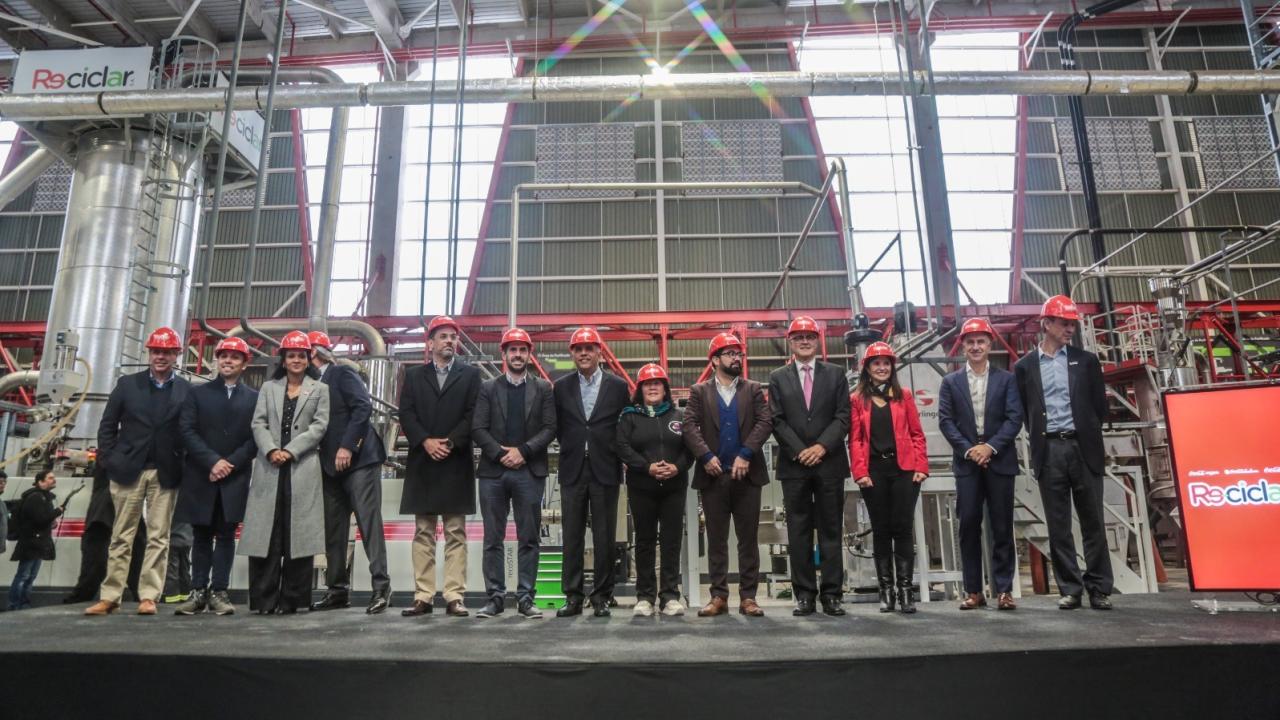
The newly opened Re-ciclar facility will process more than 350 million bottles and is located in the town of Lampa, about 40 kilometers from Santiago.
“We are very happy, because the situation has changed a lot since we began our work until today,” says a smiling Soledad Mella, president of the National Association of Recyclers of Chile .
She is one of 60,000 people in Chile – mostly women – who collect non-organic waste such as plastic, scrap metal, glass, paper and cardboard, to revalue it informally, in a de facto job that has been called grassroots collector.
“We have a direct agreement with Re-ciclar today, we deliver [the plastic bottles we collect] directly to them, not like we did before, through an intermediary who paid very low prices. Today Re-ciclar allows us to negotiate a fair and fast price in accordance with the work we do at a national level,” he adds.
And by fairness, Soledad Mella recognizes a range close to US$ 1.2 per kilo of PET1 plastic, which is paid in a maximum of three days.
This is one of the peculiarities of the plant that Coca Cola Chile inaugurated this Wednesday in the town of Lampa, some 40 kilometers from the capital, Santiago. But it is not the only one.
With an investment of US$ 35 million, the factory is operated in a joint venture by Coca-Cola Andina and Coca-Cola Embonor (in that country Coca-Cola Andina is in charge of bottling Coca Cola products in the Metropolitan region, while Coca-Cola Embonor is in charge of the regions of Valparaíso, La Araucanía, Magallanes in the far south and Arica and Antofagasta in the far north) and will allow for the first time in Chile, the production of beverage containers with food-grade recycled material.
The company's approach is entirely based on environmental sustainability, also integrating the social factor by supporting a vulnerable sector of the population such as base collectors and the new player called waste managers, small companies that collect materials.
On the one hand, the plant will allow the circulation of new plastic, strengthening the circular economy with the capacity to recycle more than 350 million bottles. Re-Ciclar also creates a hundred new internal jobs at its facilities and is expected to generate some 25,000 indirect jobs throughout the country.
“This plant fills us with pride because it has a lot to do with a global goal that the company has in the world, that we are going to be a world without waste, that we are committed to collecting the equivalent of 100% of the containers and packaging that we put on the market by 2030. And also a goal of having 50% less recycled resin by 2030,” Paola Calorio, director of Public Affairs, Communications and Sustainability for Coca-Cola Conosur, told AméricaEconomía.
The operation, which is already fully operational, is powered by solar energy through photovoltaic panels, while 80% of the water used in the production process is treated and then reused to irrigate gardens. The cranes, which are powered by lithium batteries, are 100% electric and contribute significantly to reducing the carbon footprint.
“We hope that this operation will become a fundamental axis to promote recycling in Chile and a benchmark for the circular economy and innovation not only for our country, but for all of Latin America,” said the chairman of the board of Coca-Cola Andina, Gonzalo Said .
Re-Ciclar is the most modern plant in Latin America operated by Coca-Cola and the third in the region, along with Mexico and Paraguay.
LOOKING AT THE LONG TERM
The investment in the plant is strong and significant, as it brought not only local authorities such as the Minister of Economy Nicolás Grau, but also executives from all over the continent and the top management of both boards of directors, Andina and Embonor.
And although Embonor, which also operates in Bolivia, recognizes that it was a difficult semester, they prefer to see the bottle –rather than the glass- half full.
“It was a difficult [beginning of] the year, but we are always looking at the long term and we are happy, we are content and we are, by nature, optimistic, looking to the future, we manage the best brands on the planet, we have an excellent human team, an unmatched infrastructure, so we may suddenly go through some bumps, but we look forward with great optimism,” Andrés Vicuña, president and director of Coca-Cola Embonor, told AméricaEconomía .
The firm published its results for June 2024 at the beginning of August. They showed sales revenue for the first half of the year that grew by 11.5%, reaching the equivalent of US$ 671 million and a consolidated sales volume that grew by 3.8% reaching 180 million unit cases, plus an EBITDA that grew by 2.0% to June 2024.
“In terms of sales, this was a difficult semester because we did not grow, we remained more or less flat. However, we are looking ahead with moderate optimism, but always thinking beyond the next six months, in the future,” added Vicuña.
The executive also highlighted the diversification of its beverage portfolio.
“We have practically all the alcoholic and non-alcoholic beverages consumed in the country, and that has been a significant transformation in recent years. Today, if you look at the figures, 30% of what we sell are products that were not available ten years ago, such as [the energy drink] Monster, Corona beer with the entire AB InBev package, Santa Rita wines, and Diageo liquors,” concluded Vicuña.










